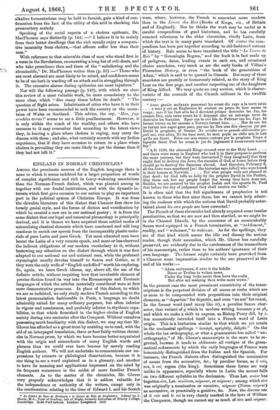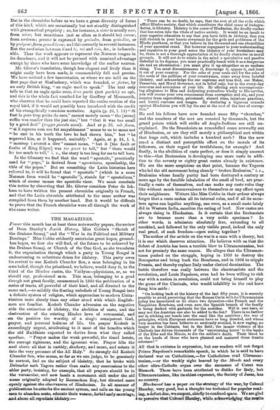ENGLAND IN NORMAN CHRONICLES.*
AMONG the proximate sources of the English language there is none to which it seems indebted for a larger proportion of words of complex significance and rich in fancy-wakening associations than the Norman-French dialect, which was planted among us together with our feudal institutions, and with the dynastic in- terests which first gave occasion to our nation to play an important part in the political system of Christian Europe. It was from the chivalric literature of this dialect that Chaucer first drew his tersely genial style, and the forms of diction and versification by which he created a new era in our national poetry ; it is from the same dialect that our legal and canonical phraseology is principally derived, and it is thence we have acquired those settled modes of naturalizing classical elements which have continued and will long continue to enrich our speech from the incomparably plastic mate- rials of pure Latin and pure Greek. Yet most educated men have learnt the Latin, of a very remote epoch, and more or lees observed the indirect obligations of our modern vocabulary to it, without bestowing any attention on the dialect through which it was first adapted to our national ear and national uses, while the professed etymologist usually devotes himself to Saxon and Gothic, as if they Were the only wells of "English undefiled" worth his exploring. So, again, we learn Greek idioms, say, above all, the use of the definite article, without inquiring how that invaluable element of precise diction found its way into the Romanesque and Teutonic languages of which the articles materially considered were at first mere demonstrative pronouns. In place of this dialect, to which we are so indebted, we only study modern French according to the latest pronunciation fashionable in Paris, a language no doubt admirably suited for many ordinary purposes, but often inferior in vigour and conciseness, and probably inferior in rhythmic capa- bilities, to that which flourished in the higher circles of English society during two centuries after the Conquest. Without ourselves possessing much familiarity with this dialect, we may say that Mr. Glover has afforded us a great treat by enabling us to read, with the aid of an interpaged translation, three or four fairly written chroni- cles in Norman prose, by which we have become better acquainted with the origin and antecedents of many English words and phrases than we could ever have become by merely reading English authors. We will not undertake to communicate our im- pressions by extracts or philological dissertations, because it is one thing to see a word explained as in a glossary, and another to have its meaning and applications impressed on the mind by its frequent recurrence in the midst of more familiar French elements. As to the matter of the chronicles, Mr. Glover very properly acknowledges that it is seldom valuable for the independence or authority of the writers, except only in the continuation relating to the time of Edward I. and his Scotch
• Le Livere de Reis de Brittanie e to Livere de Reis de Engleterre. Edited by J. Glover, M.A., Vicar of Brading, Isle of Wight, formerly Librarian of Trinity College, Cambridge. Rolls Publoatione. London: Longman,. 1865.
wars, where, however, the French is somewhat more modern than in the Livere des Reis (Books of Kings, viz , of Britain and of England). But he thinks the work may be useful as a careful compendium of good historians, and he has carefully annexed references to the older chronicles, chiefly Latin, from which the text is in many parts translated. Of course the com- pendium has been put together according to old-fashioned notions of history. Bale seems to have translated the title "Le Livere de Reis" by " Genealogia Regum," and the book is in fact made up of pedigrees, dates, leading events in each era, and occasional choice anecdotes, very much as are the early books of Villani's Florentine History, or even "the book of the generations of Adam," which is said to be quoted in Genesis. But many of these anecdotes are prettily or humorously related, as the story of King Lear on the first page, and another respecting one of the daughters of King Alfred. We may quote an easy section, which is charac- teristic of the counsels of the Church militant in the twelfth century : — "Anne gratin mclxxxx passerent les avant diz reys a la terra saint . . . e muz y out an Engleterre hi aveient en pense de fore memo la veage ; mes ii lur fast avis ke ii deveient primes destruire lee Juz, lea anemic Den, enla terre avant he il deussent aler en estrange terra de destruire les Sarazins. Epur ceo le viii Ida de Februer tnz lea Jays hi furunt trovez en lur mesons a Norwyz furunt tuez. . . . Mes de ceo fob no furunt mie sages genz paez, pur ceo ke Den nus diet chescon jar par David le prophete, el Sauter, No oceidas eas ne quando abliviscatur p0.- pull mei, cost adire, No les tuez nent, he mon pople no oblie mie le tort qu'ilz me firent. Estre ceo nus sumes certeyn par le prophete Tanya a lapostle Saint Poel he avant le jur de jugement ii resceverant nostra fey."
"A.D. 1190, the aforesaid Kings crossed over to the Holy Land. . . . and there were many in England who had it in their purpose to perform the same journey, but they were instructed [? they imagined) that they ought first to destroy the Jews, the enemies of God, at home, before they should go to destroy the Saracens abroad. And therefore, February ev all the Jews were murdered [no! the historian says killed] who were found
in their houses at Norwich Yet wise people were not pleased at that deed; for God tells us daily by the prophet David in the Psalter, Slay them not, lest my people forget the wrong they have done me. Besides, we are assured by the prophet Isaiah and, the apostle St. Paul that before the day of judgment they shall receive our faith."
It is often said that the full significance of prophecies is not. known to those who first utter them, but we cannot help admir- ing the coolness with which the notions that David probably enter- tained about his own people are here corrected !
The French of these chronicles had already acquired some insular peculiarities, so that we are now and then startled, as we might be in the Channel Islands, by the encounter of an unmistakably Sax= word equipped in a French termination, as " redditnent," readily, and "welcomer," to welcome. As for the spellings, they are of that kind which amuse the idle and dismay the serious reader, though their anomalies, which Mr. Glover has carefully preserved, are evidently due to the carelessness of the transcribers of his manuscripts, rather than to his authors' ignorance of their own language. The former might certainly have provoked from a Chaucer some imprecation similar to the one preserved at the end of his works :—
" Adam scrivener°, if evre it the befall°
Boece or Troilus to writen newe, Under thy long locks maist thou have the scalle But after my makyng thou write more trewe."
In the present case the most prominent eccentricity of the trans- criptions is the perpetual division of all nouns or verbs which are or seem to be compounded with prepositions into their original elements, as " departize "for departie, and even "en nui" for ennui, In the former word (and many like it), a peculiar Saxon char- acter, that variant of g which in modern writing becomes y or gh, and which we make a shift to express, as Bishop Percy did, by z. has anomalously intruded itself into a French word of Latin origin. This is a barbarism similar to that which we yet retain in the unclassical spellings "inveigh, sprightly, delight." On the whole the lax orthography, or what a grammarian has called " un- orthography," of Mr. Glover's manuscripts is the more to be re- gretted, because it tends to obliterate all vestiges of the gram- matical refinements by which the early languages of France were honourably distinguished from the Italian and the Spanish. For instance, the French dialects often distinguished the nominative of nouns from the accusative, &c., by peculiar forms, as li reis, rex, Is rei, regem (the king). Sometimes these forms are very unlike in appearance, especially where in Latin the accent falls on two different syllables in the declension. Thus Lat. senior has begotten sire, Lat. seniiirem, seignour, or seigneur; among which sire was originally a nominative or vocative, seignour (Norm. seignur) an accusative, or practically a genitive, &c. Now, the diverse use of li reis and is rei is very clearly marked in the laws of William the Conqueror, though we cannot say as much of sire and seignur. But in the chronicles before us we have a great diversity of forms of this kind, which are occasionally but not steadily distinguished with grammatical propriety ; so, for instance, a sister is usually seer, from sOror, but sometimes (not as often as it should be) sorour, from sororem; greater is expressed by greindre, from grcindior, or by greignur,from grandiorem; and this correctly in several instances. But the confusion between li and le, rei and reis, &e., is indeserib- able. Thus the work appears to represent the Norman. tongue in its decadence, and it will not be perused with unmixed advantage except by those who have some knowledge of the earlier sources,
Mr. Glover's translation, though less elegant and lively than it • might easily have been made, is commendably full and precise, We have noticed a few inaccuracies, as where we are told on the first page that at Shaftesbury, which was founded, ut fertur, by an early British king, "an eagle used to speak." The text only tells us that an eagle spoke once, ilvec parla (not parleit) un egk, and this is the whole fact vouched for by Geoffrey of Monmouth, who observes that he could have reported the entire oration of the royal bird, if it would not possibly have interfered with the credit of his evangelically veracious narrative. Again (p. 24, 1. 14) "Si fist is pare trop petite de asez," cannot merely mean" the [stone] coffin was smaller than the just size," but "that it was too small by a good deal" (iroppo piceola assai). And at p. 26, sub .finern, "ai li reprove corn ceo fat amyablement " seems to us to mean not " he cast in his teeth the love he had shown him," but "he reproved him, as it happened, amicably." Again, at p. 24, 1. 4, mestrop i avereit a dire" cannot mean, "bat it [the fault or faults of King Edgar] was too great to tell," but "there would be too much to tell," i. e., the story is too long for me to tell here, In the Glossary we find that the word " apostoile," practically • used for "pope," is derived from " apostolatus, apostleship, the title of the popes." But on consulting the Latin historian here referred to, it-will be found that " apostoile " (which in a more Norman form would be " apostolie "), stands for " apostolicus," which of course means the apostolic vicar. We must conclude this notice by observing that Mr. Glover considers Peter de Ick- ham to have written the present chronicles originally in French, and that the Latin chronicle attributed to the same author was compiled from them by another hand. But it would be difficult to prove that the French chronicles were all through the work of the same writer.































 Previous page
Previous page